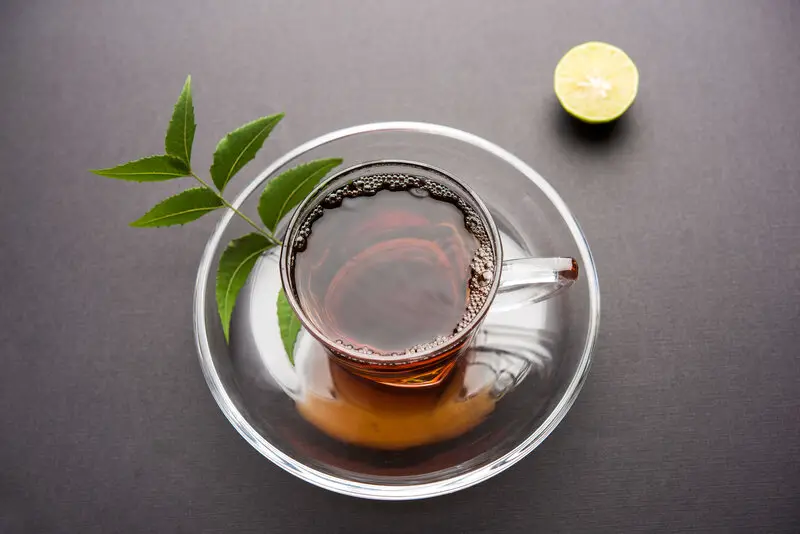What's On This Page
Neem, a cornerstone in traditional Indian medicine, is gaining recognition for its health benefits. Neem tea, made from the leaves of the neem tree, is noted for its antioxidant, anti-inflammatory, antiviral, and antimicrobial properties, contributing to immune health, digestive wellness, and skin vitality.
This blog will explore the specific benefits of neem tea, supported by both traditional insights and modern scientific research. We will focus on its role in diabetes management, potential in cancer prevention, and effects on skin health.
Discover how to safely and effectively incorporate neem tea into your daily routine for optimal health and wellbeing.
What is neem tea?
Neem tea is made from the leaves of the neem tree, native to India and parts of Asia. It has been a part of traditional Indian medicine, known for its health benefits.
Neem tea is prepared from dried neem leaves, available as loose leaves, tea bags, or capsules. Organic options, free of added preservatives and chemicals, are recommended to maximize the benefits.
The tea is known for its bitter taste, resulting from the active compounds that give it medicinal properties, including antioxidant, anti-inflammatory, antiviral, and antimicrobial effects. It supports immune health, aids digestion, and benefits the skin. To counter the bitterness, it can be blended with other herbs.
Neem tea is not only used for headaches and stomach issues but is also linked to managing diabetes and skin health, as supported by various studies. Each cup serves as a blend of traditional and modern understanding of its health benefits.
Chemical properties of neem tea
Neem tea’s chemical properties stem from bioactive compounds in the neem tree (Azadirachta indica).
1. Azadirachtin
- Source: Comparative antimicrobial activities of Neem, Amla, Aloe, Assam Tea and Clove extracts against Vibrio cholerae, Staphylococcus aureus and Pseudomonas aeruginosa
- Properties: A limonoid causing neem’s bitter taste, known for its insecticidal and pesticidal properties.
2. Nimbin and Nimbidin
- Source: Bioefficacy of azadirachtin content of neem formulation against three major sucking pests of tea in Sub Himalayan tea plantation of North Bengal, India.
- Properties: Compounds noted for anti-inflammatory, antipyretic, and antihistamine properties.
3. Trace Elements
- Source: ScienceDirect
- Properties: Identified in neem powder and tea, their effects vary based on concentrations.
4. Antioxidants
- Source: Effect of Brewing Time and Temperature on the Release of Manganese and Oxalate from Lipton Tea and Azadirachta Indica (Neem), Phyllanthus Amarus and Moringa Oleifera Blended Leaves.
- Properties: Present in neem tea, combat free radicals, reducing oxidative stress and inflammation.
5. Flavonoids and Polyphenols
- Source: ScienceDirect
- Properties: Enhance neem’s antioxidant activity, aiding in chronic disease management and health promotion.
6. Fatty Acids and Related Compounds
- Source: Neem (Azadirachta indica A. Juss) – A Nature’s Drugstore
- Properties: Found in neem, known for medicinal and therapeutic applications.
These compounds collectively contribute to neem tea’s anti-inflammatory, antioxidant, antiviral, and antimicrobial effects.

Nutritional Facts of neem tea
Neem tea’s nutritional components include:
- Trace Elements:
- Source: ScienceDirect
- Essential minerals for body growth and function.
- Antioxidants:
- Source: Effect of Brewing Duration
- Combat free radicals, reducing oxidative stress and inflammation.
- Flavonoids and Polyphenols:
- Source: ScienceDirect
- Contribute to antioxidant activity, aiding in chronic disease management.
- Fatty Acids and Related Compounds:
- Source: Neem and Its Potential
- Essential for cell building, brain function, and immune response.
- Azadirachtin:
- Source: Comparative Evaluation
- A limonoid with insecticidal and pesticidal properties.
- Nimbin and Nimbidin:
- Source: Bioefficacy of Azadirachtin
- Have anti-inflammatory, antipyretic, and antihistamine properties.
Consult a healthcare professional before adding neem tea to your diet, especially for pregnant, nursing, or individuals with health conditions.
Benefits of neem tea
Neem tea, from the neem tree (Azadirachta indica), offers several health benefits:
- Antimicrobial Properties: Neem tea combats pathogens like bacteria, viruses, and fungi. It’s effective against Vibrio cholerae, Staphylococcus aureus, and Pseudomonas aeruginosa (Mehrotra, Srivastava, & Nandi, 2010).
- Immune Support: Rich in antioxidants, neem tea strengthens the immune system and reduces oxidative stress (Ezeike, Aguuzue, & Thomas, 2011).
- Anti-inflammatory: Nimbin and nimbidin in neem reduce inflammation (Roy & Gurusubramanian, 2011).
- Digestive Health: Neem tea supports digestion and addresses stomach issues.
- Skin Benefits: The tea’s antimicrobial and anti-inflammatory properties help treat skin conditions.
- Detoxification: Neem tea aids in toxin elimination and liver support.
- Blood Sugar Control: Neem may help manage diabetes.
- Cancer Prevention: Preliminary studies suggest neem’s potential in cancer prevention.
Sources:
- Mehrotra, S., Srivastava, A. K., & Nandi, S. P. (2010). Comparative antimicrobial activities.
- Roy, S., & Gurusubramanian, G. (2011). Bioefficacy of azadirachtin.
- Ezeike, C. O., Aguuzue, O. C., & Thomas, S. A. (2011). Effect of Brewing Time and Temperature.
Consultation with a healthcare professional is recommended before using neem tea, especially for those with health conditions or on medication.
Potential downsides
Limited information exists on neem tea’s downsides. Here are some considerations:
1. Bitter Taste:
Neem tea’s bitter taste can be unpalatable; blending it with other herbs can mitigate this (Source: User-provided text).
2. Pregnancy and Breastfeeding:
The provided sources lack data on neem tea’s safety during pregnancy and breastfeeding. It’s advised for these individuals to avoid it.
3. Allergic Reactions:
Individuals trying neem tea for the first time should monitor for allergic reactions.
4. Drug Interactions:
Individuals on medication should consult a healthcare professional before consuming neem tea to avoid potential interactions.
5. Overconsumption:
Monitoring the dosage and concentration of neem tea is essential to avoid potential side effects, not detailed in the provided sources.
6. Lack of Research:
More research is needed to understand neem tea’s potential downsides and side effects, as the provided sources focus mainly on its benefits and chemical properties.
In essence, caution and consideration of individual health status, allergies, and medications are vital before consuming neem tea. Consulting a healthcare professional is recommended when unsure.

How to make neem tea
Ingredients:
- Neem leaves (fresh or dried)
- Water
- Optional: honey, lemon, or other herbs to taste
Steps:
- Collect Neem Leaves:
- Fresh Leaves: Gather a handful of fresh neem leaves. Ensure they are clean and free from pesticides.
- Dried Leaves: Alternatively, you can use dried neem leaves, which might be available in stores or online.
- Prepare the Leaves:
- If you are using fresh neem leaves, wash them thoroughly to remove any dirt or debris.
- If you prefer, you can crush the leaves slightly to release their natural oils and enhance the flavor of the tea.
- Boil Water:
- Boil an appropriate amount of water. The general recommendation is one cup of water for a handful of leaves.
- Infuse the Neem Leaves:
- Once the water reaches a boil, add the neem leaves.
- Reduce the heat and let it simmer for about 15-20 minutes. The water will start to change color as it absorbs the properties of the neem leaves.
- Strain and Serve:
- Strain the tea to remove the leaves.
- Pour the tea into a cup.
- Optional Add-ins:
- Neem tea has a bitter taste due to its active compounds. To make it more palatable, you can add honey, lemon, or mix with other herbs to improve the flavor.
- Enjoy:
- Sip the tea slowly and enjoy. It can be consumed either hot or cold, depending on your preference.
How many cups of neem tea can you drink?
There is limited information about the daily limit for consuming neem tea. Start with one cup per day and monitor your body’s reaction. If beneficial without adverse effects, consider increasing the amount. Consult a healthcare professional for personalised advice, considering your health status and potential medication interactions. Adhere to recommended dosages to avoid toxicity or adverse effects.
FAQs
What is neem seed medicine?
Neem seed medicine is derived from the seeds of the neem tree (Azadirachta indica). Neem seed meal tea, made from the residue after neem oil extraction, is used in both health and agriculture.
The tea’s insecticidal properties, attributed to the limonoid azadirachtin, effectively control pests like termites (Roy & Gurusubramanian, 2011). Neem seed products also have antimicrobial, anti-inflammatory, and antipyretic properties, used in treating skin disorders, infections, and metabolic diseases (Hashmat, Azad, & Ahmed, 2012).
Use neem products with caution, considering factors like age and health status, and consult a healthcare professional for appropriate dosage and usage.
References
- Roy S., Gurusubramanian G. (2011). Bioefficacy of azadirachtin content of neem formulation against three major sucking pests of tea in Sub Himalayan tea plantation of North Bengal, India. Agricultura Tropica et Subtropica, 44(3), 134-143.
- Hashmat, I., Azad, H., & Ahmed, A. (2012). Neem (Azadirachta indica A. Juss) – A Nature’s Drugstore: An overview. International Research Journal of Biological Sciences, 1(6), 76-79. www.isca.in
Can I drink neem tea every day?
Consuming neem tea daily requires caution due to its potent compounds. Neem has health benefits but can be toxic in large doses or prolonged use, potentially impacting the liver and kidneys (Ezeike, C. O., Aguuzue, O. C., & Thomas, S. A., 2011; Hashmat, I., Azad, H., & Ahmed, A., 2012). Consult a healthcare professional for personalized advice on dosage and frequency, considering your health and medication interactions.
References:
- Ezeike, C. O., Aguuzue, O. C., & Thomas, S. A. (2011). Retrieved from Effect of Brewing Time and Temperature
- Hashmat, I., Azad, H., & Ahmed, A. (2012). Retrieved from Neem – A Nature’s Drugstore
Leave a Reply